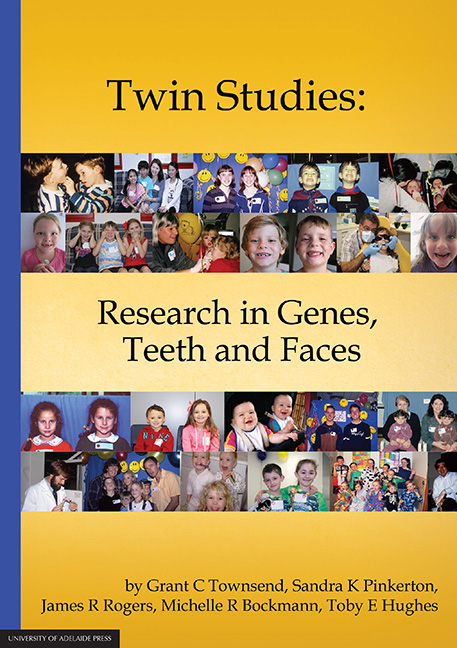Book contents
- Frontmatter
- Foreword
- Preface
- Dedication
- Photographic acknowledgements
- Ethical approval
- Acknowledgements
- Contents
- Chapter One A tour of the mouth
- Chapter Two A historical perspective
- Chapter Three Phases of research involving twin studies of teeth and faces
- Chapter Four Cohort 1: Teeth and faces of South Australian teenage twins
- Chapter Five Cohort 2 – A longitudinal study of dental and facial development in Australian twins and their families
- Chapter Six Cohort 3 – Tooth emergence and oral health in Australian twins and their families
- Chapter Seven Publications and theses relating to the Adelaide Twin Studies
- Glossary of terms
- Appendix 1
Chapter Six - Cohort 3 – Tooth emergence and oral health in Australian twins and their families
Published online by Cambridge University Press: 05 February 2016
- Frontmatter
- Foreword
- Preface
- Dedication
- Photographic acknowledgements
- Ethical approval
- Acknowledgements
- Contents
- Chapter One A tour of the mouth
- Chapter Two A historical perspective
- Chapter Three Phases of research involving twin studies of teeth and faces
- Chapter Four Cohort 1: Teeth and faces of South Australian teenage twins
- Chapter Five Cohort 2 – A longitudinal study of dental and facial development in Australian twins and their families
- Chapter Six Cohort 3 – Tooth emergence and oral health in Australian twins and their families
- Chapter Seven Publications and theses relating to the Adelaide Twin Studies
- Glossary of terms
- Appendix 1
Summary
Introduction
While the focus of our studies involving Cohorts 1 and 2 was on dental development and morphology, we decided to concentrate more on oral health and disease, particularly dental decay, when studying Cohort 3. The major developments in molecular biology have also enabled research involving this cohort to make use of new technologies and approaches to study genetic effects more directly.
Dental decay (caries) is the most common chronic disease affecting Australian children, despite the implementation of public health initiatives, such as fluoridated drinking water and toothpastes. The disease can cause pain and systemic infection, lead to speech and learning problems, and is a predictor for poor general health. Treatment for dental caries inflicts a huge economic burden on society, accounting for 6.5 per cent ($AUS5.3 billion) of total health care expenditure in Australia per year (Armfield et al., 2009; Ha et al., 2011).
In 2004, we submitted an application for funding to the NHMRC for a new initiative involving Australian twins and their families. The title of this grant application was ‘Tooth emergence and oral streptococci colonisation: a longitudinal study of Australian twins’. Although the application was supported, funding was only provided for three years rather than the five years that had been requested. The study commenced in 2005, with the twins and their families comprising what is now referred to as Cohort 3. The chief investigators on this project were Grant Townsend, Kim Seow, Theo Gotjamanos, Toby Hughes, Neville Gully and Lindsay Richards.
The first aim of the project was to clarify the influences of genetic and environmental determinants on variation in the emergence (often referred to as tooth eruption) of the human primary teeth by applying modern methods of genetic model- fitting to longitudinal data obtained from young monozygotic and dizygotic twin pairs. The intention was to compare variability in both the timing and sequencing of tooth emergence within and between the twins, and to relate these findings to measures of physical development and other pre- and postnatal factors. It was also planned to apply linkage analyses to detect quantitative trait loci (QTLs) for dental development using genome scans of DNA derived from cheek cells.
- Type
- Chapter
- Information
- Twin StudiesResearch in Genes, Teeth and Faces, pp. 135 - 164Publisher: The University of Adelaide PressPrint publication year: 2015



